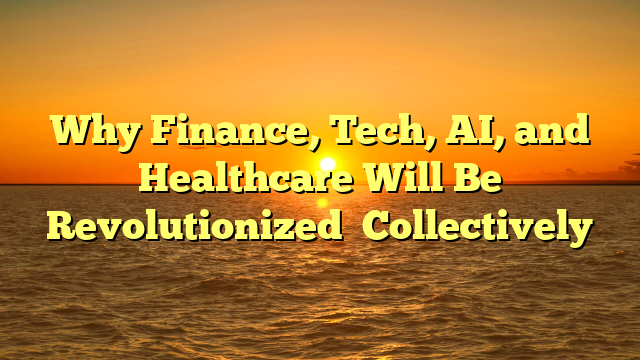—
In the modern era, the convergence of financial systems, technology, intelligence, and health is redefining the way we interact. This guide explores how these four domains are interconnected and what it means for the next generation.
Finance and Technology: The Digital Synergy
Digital transformation has changed the financial industry. From fintech apps to digital wallets, the way we manage money is no longer traditional.
Financial technology has enabled instant transactions, enhanced security, and greater financial inclusion. Users can now save with a few taps on their smartphone. Apps like PayPal, Revolut, and Robinhood have democratized the world of finance.
In addition, blockchain provides a decentralized way to record transactions. Cryptocurrencies like Bitcoin represent a new era of digital assets that disrupt traditional banking systems.
Artificial Intelligence: The Brain Behind the Systems
Artificial intelligence (AI) is at the center of this transformation. In finance, AI is used to manage portfolios. Algorithms analyze massive datasets in microseconds to make informed decisions.
In healthcare, AI is powering medical breakthroughs. It can diagnose diseases earlier than humans, personalize treatments, and even perform surgeries. As an example, AI tools like IBM Watson have been used in oncology to help clinicians decide on cancer treatments.
AI also plays a role in mental health. Virtual therapists offer immediate support for those struggling with anxiety or depression. This is a vital step forward, especially in rural areas where mental health professionals are scarce.
Smart Health: The Technology That Saves Lives
Digital health is one of the fastest-growing sectors today. Wearables like Apple Watch and Fitbit can record heart rate, sleep patterns, and oxygen levels. These tools empower individuals to take control of their well-being.
Virtual consultations is another game-changer. During the COVID-19 pandemic, millions of people relied on telehealth services to manage chronic diseases without visiting hospitals.
What’s more, data collected from wearable devices is being analyzed to predict potential health issues before they become serious. This kind of predictive analytics can save lives and decreases healthcare costs.
Financial Intelligence: Smarter Decisions, Better Outcomes
Money knowledge is becoming a crucial part of everyday decision-making. With the abundance of data and tools, people are now more equipped than ever to make informed financial choices.
Personal finance software help users track expenses, set goals, and boost savings. Platforms like Mint, YNAB, and PocketGuard are widely used.
In addition, AI can analyze your financial behavior and suggest strategies to optimize your portfolio. It can alert you of unnecessary spending, showcase potential investments, and predict market risks.
This kind of financial intelligence is vital in a world where inflation, economic crises, and digital scams are prevalent.
Unified Future: Where Everything Connects
The integration of finance, tech, intelligence, and health is creating a holistic ecosystem. Imagine a future where:
Your virtual companion manages your schedule, finances, and health check-ups.
Wearable tech monitor your body and notify you — and your doctor — in case of health anomalies.
Babeltoto adjust based on your spending patterns and personal goals.
AI systems protect your online identity by learning your behavior and blocking suspicious activity instantly.
This is not a dream. These technologies already operate, and they’re only becoming more powerful.
Challenges and Considerations
Of course, with all this progress, there are challenges. Privacy concerns remain top priorities. Sharing medical data must be handled with strict regulation.
There’s also the threat of technological unemployment as automation and AI augment human roles. Education and upskilling will be essential in preparing the workforce for the new economy.
Lastly, some populations have equal access to these tools. Bridging the inequality is necessary to ensure that these innovations benefit everyone, not just the privileged few.
Conclusion: Embracing the Interconnected Future
Finance, technology, intelligence, and health are no longer separate worlds. They are intertwined to create a smarter, healthier, and more efficient society.
Leveraging this interconnected future means learning about the benefits and risks. It also means staying adaptable and making conscious choices about the tools we use.
The world is being built at the crossroads of finance, technology, intelligence, and health. The question is: How will you adapt?
